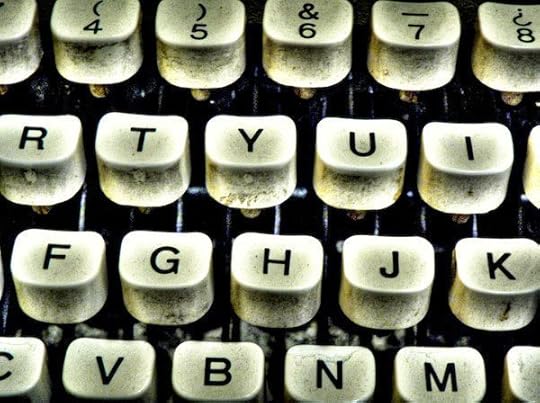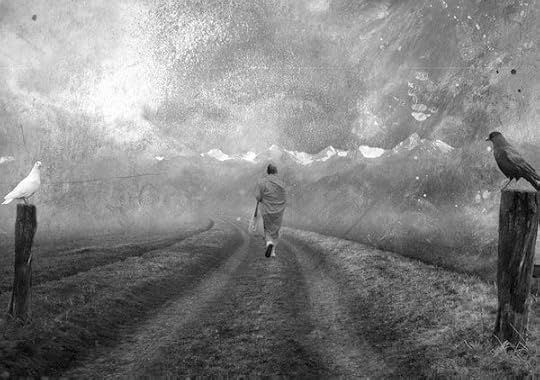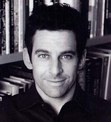Sam Harris's Blog, page 34
May 20, 2011
The Perils of the Print Interview

(Photo by Victor Nuno)
Strange bonds of trust and self-deception tend to grow between journalists and their subjects. Janet Malcolm examines these fraught encounters in a fascinating book, The Journalist and the Murderer, which focuses on the relationship between Joe McGinniss, the best-selling author of Fatal Vision, and Jeffrey MacDonald, a Green Beret physician convicted of murdering his pregnant wife and two young daughters.
Malcolm's book is especially interesting for its diagnosis of the ethical problems posed by the standard print interview:
Every journalist who is not too stupid or too full of himself to notice what is going on knows that what he does is morally indefensible. He is a kind of confidence man, preying on people's vanity, ignorance, or loneliness, gaining their trust and betraying them without remorse. Like the credulous widow who wakes up one day to find the charming young man and all her savings gone, so the consenting subject of a piece of nonfiction writing learns—when the article or book appears—his hard lesson. Journalists justify their treachery in various ways according to their temperaments. The more pompous talk about freedom of speech and "the public's right to know"; the least talented talk about Art; the seemliest murmur about earning a living.
Malcolm is probably being too hard on herself and her fellow journalists here—and in this way hoping to appear unsullied. Nevertheless, these are remarkable disclosures. As someone who has sat for his fair share of print interviews, I can attest to the insidious way that one's vanity and trust can work to one's disadvantage. Malcolm captures the resulting derangement perfectly:
Something seems to happen to people when they meet a journalist, and what happens is exactly the opposite of what one would expect. One would think that extreme wariness and caution would be the order of the day, but in fact childish trust and impetuosity are far more common. The journalistic encounter seems to have the same regressive effect on a subject as the psychoanalytic encounter. The subject becomes a kind of child of the writer, regarding him as a permissive, all-accepting, all-forgiving mother, and expecting that the book will be written by her. Of course, the book is written by the strict, all-noticing, unforgiving father.
Malcolm's fondness for Freud has not aged entirely well, but she provides an unusually candid look at how inimical a journalist's hopes often are to those of her subject.
In my experience with print journalists, the distinction between remarks being uttered on- or off-the-record is held sacrosanct, but the distinction between truth and falsity sometimes isn't. It is instructive that the magical power of the phrase "this is off-the-record" extends only to future utterances; it can never be used to take one's foot out of one's mouth. This temporal asymmetry has nothing to do with the second law of thermodynamics. Rather, it exposes the value that print journalists place on the possibility that their subjects might yet say something terrifically stupid.
Granted, the "gotcha" interview has its place—for instance, when a politician discloses opinions or habits that will be of genuine interest to voters. But when the point of an interview is to convey information and ideas clearly, the motive to catch a subject saying something infelicitous appears bizarre. In my own case, the most inflammatory statements I have ever made are ones that I have written and remain willing to defend. And yet, some journalists act as though they have "caught" me saying that Islam is a loathsome religion, that its core principles are degrading and idiotic, and that, even in its wisest moments, it isn't fit to lick the boot of Jainism. I have sometimes found that if later clarification is called for—perhaps I should emphasize that I'm talking about Islam and Jainism as doctrines, not about Muslims and Jains as human beings—journalists can be reluctant to incorporate such nuance, while remaining steadfast in their commitment to printing the original statement.
One might worry that such complaints put an unfair burden on print journalism. After all, with radio or television one doesn't get a chance to review one's remarks at all, much less amend them. But this ignores some important differences between these media. Print is the only format where hours of conversation are regularly summarized, in whichever way a journalist finds pleasing, with perhaps only a stray quotation or two thrown in. From the subject's point of view, this allows for a frightening degree of distortion, accidental or otherwise. Compare this to television and radio where most interviews air unedited. Within these media, whether one is given 5 minutes or 50, one is generally allowed to make as much sense as possible without later tampering. Granted, interviews can be hostile, or framed by other material, but one is almost always spared the surprise of seeing oneself fundamentally misused. The same cannot be said for print.
As Malcolm points out, the invention of the tape-recorder created an entirely new way to embarrass oneself on the page: for very few of us speak in perfectly fluid, grammatically correct prose. The mere transcription of spoken words, especially when only isolated quotations will be published, can make almost anyone appear less than articulate or forthcoming. As Malcolm says:
When a journalist undertakes to quote a subject he has interviewed on tape, he owes it to the subject, no less than to the reader, to translate his speech into prose. Only the most uncharitable (or inept) journalist will hold a subject to his literal utterances and fail to perform the sort of editing and rewriting that, in life, our ear automatically and instantaneously performs.
I have occasionally found myself in the hands of so uncharitable (or inept) a journalist—where every "uh" and "I mean" was transcribed with a faithfulness appropriate to signals intelligence in time of war. When I complained that the resulting text made everyone look silly, reading more like a case study of neurological impairment than an interview, I was treated to a lecture about the necessity of maintaining the "naturalness" of my natural ineloquence.
As Malcolm observes, it is a striking fact about human perception that an exact rendering of speech is punitive to the subject only in print. Very few of us can have our speech transcribed without being made to seem less eloquent than we actually are. My friend and colleague Christopher Hitchens is one of the rare exceptions to this rule—and it is precisely because he achieves what could be thought of as "print velocity" with his first utterance, and stays safely in orbit for paragraphs at a stretch, that he is such a joy to listen to. He speaks more or less as he writes. Which, given how beautifully he writes, is unforgivable.
The discrepant goals of journalist and subject are never more apparent than when one requests approval over one's final quotes. Whenever I ask to see the words that will be attributed to me in an article, I am generally accommodated; however, on those few occasions when I have attempted to improve these words with a little editing of my own, one would think that I had requested nude photos of the journalist's child. My efforts to sharpen up my earlier statements have been generally met by mortified silence, followed by a pious invocation of an editorial policy that does not countenance such behavior. I have had occasion to remind a journalist that we had originally planned to conduct our interview by email, in which case he or she would have received my polished responses in first place. More silence.
Of course, I'm entirely sympathetic with the desire on the part of journalists and their editors to print honest and natural speech. But it seems to me that very few consumers of media realize that print interviews present unique opportunities for distortion and, therefore, unique risks for their subjects. For what it's worth, I can say that whenever I witness someone appearing especially foolish in print, however deserving of criticism I may find this person in other contexts, my schadenfreude now rarely gets the better of my compassion.

May 10, 2011
How to Meditate

(The one who does not judge, by h.koppdelaney)
There are many forms of introspection and mental training that go by the name of "meditation," and I have studied several over the years. As I occasionally speak about the benefits of these practices, people often write to ask which I recommend. Given my primary audience—students of science, secularists, nonbelievers, etc.—these queries usually come bundled with the worry that most traditional teachings about meditation appear intellectually suspect.
Indeed, it is true that many contemplative paths ask one to entertain unfounded ideas about the nature of reality—or, at the very least, to develop a fondness for the iconography and cultural artifacts of one or another religion. Even an organization like Transcendental Meditation (TM), which has spent decades self-consciously adapting itself for use by non-Hindus, can't overcome the fact that its students must be given a Sanskrit mantra as the foundation of the practice. Ancient incantations present an impediment to many a discerning mind (as does the fact that TM displays several, odious signs of being a cult).
But not all contemplative paths kindle the same doubts or harbor the same liabilities. There are, in fact, many methods of meditation and "spiritual" inquiry that can greatly enhance our mental health while offering no affront to the intellect.
For beginners, I always recommend a technique called vipassana (Pali, "insight"), which comes from the oldest tradition of Buddhism, the Theravada. The advantage of vipassana is that it can be taught in an entirely secular way. Experts in this practice generally acquire their training in a Buddhist context, of course—and most retreat centers in the U.S. and Europe still teach its associated Buddhist philosophy. Nevertheless, this method of introspection can be brought within any secular or scientific context without embarrassment. The same cannot be said for most other forms of "spiritual" instruction.

May 6, 2011
On Matters Zero-Sum

(Photo by JD Hancock)
There is one concern that seems to derail every discussion about my view of morality. The philosopher Russell Blackford put it this way in his review of The Moral Landscape:
Why, for example, should I not prefer my own well-being, or the well-being of the people I love, to overall, or global, well-being?... Harris never provides a satisfactory response to this line of thought, and I doubt that one is possible. After all, as he acknowledges, the claim that "We should maximize the global well-being of conscious creatures" is not an empirical finding. So what is it? What in the world makes it true? How does it become binding on me if I don't accept it?
I believe that Blackford (and most everyone else) has confused two separate questions:
(A) What is the status of moral truth?—that is, what does it mean to say that one state of the world is "better" than another?
(B) What is rational for a person to do, given what he or she wants out of life?
The argument I present in my book focuses on (A), but has implications for (B). The concern about zero-sum conflict (whether between individuals or between an individual and society) focuses on (B). Consider the following example:

May 5, 2011
Who Says Science has Nothing to Say About Morality?
Sam Harris and Richard Dawkins discuss The Moral Landscape. This event was held at The Sheldonian Theatre, University of Oxford, on April 12th, 2011.

Who Says Science has Nothing to Say About Morality?
Sam Harris and Richard Dawkins discuss The Moral Landscape. This event was held at The Sheldonian Theatre, University of Oxford, on April 12th, 2011.

May 4, 2011
Further Thoughts on the Death of Osama bin Laden

Supporters of Pakistani religious party Jamiat Ulema-e-Islam rally to condemn the killing of Osama bin Laden in Quetta, Pakistan on Monday, May 2, 2011. (AP Photo/Arshad Butt)
President Obama has announced that the U.S. government will not release photos of Osama bin Laden's corpse. I don't know which fact is more alarming, that this appears to have been a very difficult decision or that the head of the CIA believes that these photos will leak in any case. Officially placating the conspiracy theorists of the Muslim world would have been fatuous in the extreme. Let them waste their lives chasing bin Laden's ghost. But the idea that we cannot contain a few photos beggars belief. Which member of Seal Team 6 is going to put them on his Facebook page?
Of course, catering to the doubts of conspiracy theorists wouldn't have been as craven as the pains we took to bury bin Laden in compliance with shariah law. Apologists for Islam insist that bin Laden was a terrible Muslim who represented no genuine strand of the faith. One wonders, therefore, who would have been offended if we had just kicked his corpse into the sea without a word. Indeed, one might wonder why our government wasn't afraid to grant this ghoulish man full Muslim honors. Shouldn't this have offended the true adherents of so peaceful and tolerant a religion?
In any case, it is time we ignored the fathomless depths of Muslim "sensitivity" on such matters. Anyone provoked by our denying bin Laden his last rites would have thereby declared himself an enemy of civilization. Why not allow such people to step forward so that they can be photographed (as above)?
And we should not let the hopefulness of this moment go to our heads. Thomas Friedman has grown so manic as to imagine that bin Laden was never very popular among Muslims in the first place:
Very few Arabs actively supported Bin Laden, but he initially drew significant passive support for his fist in the face of America, the Arab regimes and Israel. But as Al Qaeda was put on the run, and spent most of its energies killing other Muslims who didn't toe its line, even its passive support melted away (except for the demented leadership of Hamas).
Here, Friedman has taken flight on the fairy wings of false nuance. Support for bin Laden, al Qaeda, and the practice of suicide bombing—passive or otherwise—was shockingly high in almost every Muslim community where one could safely conduct a poll in the aftermath of September 11th, 2001. Yes, these terrifying sentiments are on the wane in most places. How could they not be? As Friedman points out, Al Qaeda has done little more than slaughter innocent Muslims in the meantime. But current levels of admiration for bin Laden are still appalling. Let's hope the downward trend continues and that someday a mere 10 percent of Muslims support global jihad. Today, this would equate to 150 million people. Winning the war of ideas to this degree would represent extraordinary progress. But the existence of 150 million friends of bin Laden, spread over scores of countries, would still be no small problem for the rest of us.

May 1, 2011
Osama bin Laden: 1957-2011

I have no illusions that this will be the end of the war on terror, but it does not seem irrational to think that it could be the beginning of the end. Personally, I feel like a tumor was just removed from my brain—so present has the man been in my thoughts this last decade.
I cannot begin to express my gratitude and admiration for our troops…

April 30, 2011
The Strange Case of Greg Mortenson

(Photo by wili_hybrid)
Greg Mortenson, author of the best sellers Three Cups of Tea and Stones into Schools, has accomplished an astonishing fall from grace. As 60 minutes first reported, and the best-selling author Jon Krakauer has since spelled out in grim detail, Mortenson offers us a rare glimpse of moral strangeness: He is a true philanthropist who has lived a life of heroic service to others; he also appears to be a compulsive liar, ego-maniac, and thief. These revelations are very sad, of course, but the above links make for fascinating viewing and reading.

April 28, 2011
Same Old New Atheism: On Sam Harris
By Jackson Lears
April 27, 2011
[Note: This may be the most idiotic and unbalanced response to my work I have ever come across.—SH]


Same Old New Atheism: On Sam Harris
By Jackson Lears
April 27, 2011
[Note: This may be the most idiotic and unbalanced response to my work I have ever come across.—SH]


Sam Harris's Blog
- Sam Harris's profile
- 9007 followers



